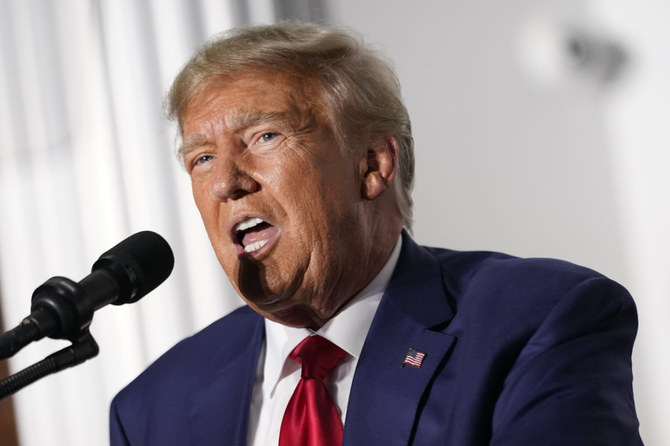Dalia Al-Aqidi
Numerous US presidents, including former President Donald Trump, have found themselves embroiled in scandalous controversies. However, it is worth noting that, in the entire expanse of US presidential history, no incumbent president has ever been formally charged with criminal offenses committed during their tenure at the White House. Nevertheless, a handful of presidents have encountered situations that brought them perilously close to such indictments.
In the annals of American history, a mere three US presidents have undergone the solemn and weighty process of impeachment orchestrated by Congress. This exclusive group is made up of Andrew Johnson, Bill Clinton and Trump, with the last of these distinguished by the rare occurrence of being impeached twice during his single term in office. Notwithstanding these proceedings, it is essential to underscore that no American president has ever been removed from power as a result of impeachment.
Among the quartet of Johnson, Clinton, Trump and Richard Nixon, who faced the specter of formal impeachment inquiries in the House of Representatives, it is noteworthy that only Nixon did not reach the point of proper impeachment. Furthermore, various other presidents have been subjected to threats of impeachment from their political adversaries, but these opponents failed to garner significant traction and support within the chambers of Congress. The framers of the Constitution deliberately crafted an arduous path for Congress to traverse when seeking to depose a sitting president. The impeachment process commences within the House of Representatives, where a formal inquiry is initiated. Should the House Judiciary Committee identify sufficient grounds, its members meticulously draft and endorse articles of impeachment, which are subsequently put to a vote in the full House.
Trump stands alone in a distinctive and unprecedented position among former US presidents. Notably, he is the sole former president in history to face a mounting array of criminal charges originating from multiple states. First up is Florida. In early 2022, the Department of Justice investigated Trump’s retention of classified documents after his presidential tenure ended. In a significant development in June of the same year, a legal representative for Trump asserted that all classified records had been duly surrendered. However, a subsequent search by the FBI at Trump’s Mar-a-Lago resort discovered and seized 102 documents bearing classified markings.
As a result, on June 9, Trump was formally indicted on 37 felony charges, while his longtime aide Walt Nauta faced allegations encompassing six felony charges. Trump’s charges included 31 counts of willful retention of national defense information, violating the Espionage Act. Additionally, Trump faces four counts of obstruction and two counts of false statements. The charges reflect severe allegations related to the handling of classified information and potential obstruction of justice. The legal saga surrounding former President Trump reached a pivotal moment on March 30, when a grand jury in Manhattan favored his indictment. Five days later, local prosecutors publicly disclosed the specific criminal charges leveled against him, comprising an extensive array of 34 felony counts of violating a New York law concerning corporate record-keeping. Trump made an extraordinary appearance, voluntarily surrendering himself to the authorities. He underwent the standard procedures associated with being processed as a criminal defendant, entered a plea of not guilty and was subsequently released without the requirement of posting bail.
This notable episode marked a significant milestone in the legal proceedings against the former president. Meanwhile, there is an ongoing legal situation in Georgia pertaining to the former president. Investigations are being carried out concerning his activities during the 2020 election. While the specific details and possible charges are yet to be determined, the possibility exists that Trump will face legal consequences in the state.
In Washington, federal prosecutors have initiated a thorough investigation into the actions of Trump, focusing on his alleged endeavors to undermine and subvert the results of the 2020 presidential election. This comprehensive inquiry also examines his purported involvement in the Capitol insurrection that unfolded on Jan. 6, 2021. The objective is to uncover the full extent of Trump’s actions and assess any potential legal consequences arising from his role in these events. Given the mounting criminal charges against him, the possibility of Trump receiving a presidential pardon becomes a delicate and complex matter. With such an array of legal obstacles to navigate, the prospect of a pardon rests solely on his own ability to maneuver his way through the intricate legal landscape. Having said that, nobody could promise Trump a presidential pardon but Trump himself.
As citizens diligently engage in the democratic process of evaluating the policies and plans put forth by political leaders, there is a notable faction within the Republican Party that is unwaveringly committed to defending Trump. While voters conscientiously assess the proposals and visions presented to them, this particular group finds itself immersed in vigorous advocacy on Trump’s behalf. Drawing from my personal experience of living under oppressive regimes and autocratic rule, one crucial lesson that resonates profoundly is the importance of never prioritizing the interests of a single leader over those of the country and its people. History has shown that, when blind loyalty and unwavering allegiance are bestowed upon a leader, it can have severe ramifications for the nation as a whole. The essence of a democratic system lies in the ability of citizens to critically analyze and weigh up the merits of the different policies and approaches put forth by political leaders. By assessing their plans and evaluating their potential impact on the welfare of the people, voters can make informed decisions that align with their values and aspirations.
However, the phenomenon of prioritizing a leader above country and party is not unique to any specific political ideology or nation. It can occur in various contexts, often driven by a combination of personal loyalty, ideological alignment and a deep-seated belief in the leader’s abilities or promises. In a robust and healthy democratic system, citizens must maintain a critical mindset and hold leaders accountable for their actions. The country’s welfare and progress should always take precedence over personal allegiances or party affiliations.
Arab News







